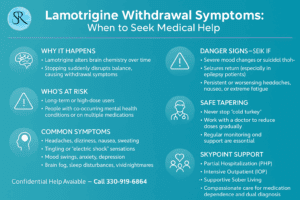Wondering if it’s just a headache or something more serious after stopping lamotrigine? Get the facts on withdrawal and know when it’s time to reach out for help.

That nagging headache that won’t quit. The dizziness that makes you grab onto furniture. The mood swings that have your family walking on eggshells. If you’ve recently stopped taking lamotrigine, these symptoms might not be random bad luck. Lamotrigine withdrawal symptoms can catch people off guard, especially when they’re not prepared for what their body might go through during this transition.
Many people assume that stopping a medication will simply return them to their baseline state. But lamotrigine, commonly known as Lamictal, creates physical dependence over time. When you stop taking it, your body needs time to readjust to functioning without this chemical support.
The tricky part is knowing which symptoms are normal parts of withdrawal and which ones signal that you need professional medical attention right away.
Why Lamotrigine Withdrawal Happens and Who’s at Risk
Lamotrigine gets prescribed for epilepsy and bipolar disorder because it helps stabilize brain chemistry over the long term. Your body gradually adapts to having this medication in your system, adjusting its natural processes to work alongside the drug’s effects. When you stop taking lamotrigine suddenly, your brain chemistry gets thrown off balance.
Think of it like removing a support beam from a building that’s been holding up the structure for years. Everything else has to scramble to compensate, and the adjustment period can feel chaotic and unpredictable.
Certain factors increase your risk of experiencing more severe withdrawal symptoms. People who’ve been taking lamotrigine for months or years face higher risks than those who’ve only used it briefly. Higher doses also tend to create more intense withdrawal experiences.
If you’re taking other psychiatric medications alongside lamotrigine, or if you have co-occurring mental health conditions, your withdrawal process becomes more complicated. Your brain has to readjust not only to the absence of lamotrigine but also to how that change affects your other medications and underlying conditions.
Common Lamotrigine Withdrawal Symptoms
Physical symptoms often hit first and can feel surprisingly intense. Headaches rank among the most common complaints, ranging from mild tension to severe migraines that interfere with daily activities. Dizziness and balance problems make simple tasks like walking upstairs feel risky.
Many people experience tingling sensations in their hands and feet, almost like mild electric shocks running through their extremities. Nausea and vomiting can make it difficult to keep food down, while excessive sweating happens even when you’re not physically active.
Psychological symptoms of withdrawal tend to be the most challenging for people to handle. Mood swings quitting Lamictal can be dramatic and unpredictable. You might feel fine one moment and deeply depressed or anxious the next, often without any clear trigger.
Brain fog makes it hard to concentrate on work or conversations. Some people describe “brain zaps,” which feel like brief electrical sensations in their head. Sleep becomes disrupted, with either insomnia keeping you awake or vivid nightmares making rest feel impossible.
The most serious symptoms require immediate medical attention. If lamotrigine was helping control seizures, stopping the medication can cause seizures to return, sometimes more severely than before. Suicidal thoughts or severe mood changes that feel overwhelming signal that professional help is needed right away.
Timeline: How Long Do Withdrawal Symptoms Last?
The lamotrigine withdrawal timeline varies by person, but patterns are common.
- Symptoms can begin within days of stopping
- Most acute effects last one to two weeks
- Some symptoms, especially psychological ones, may linger for months
Your overall health, dosage, and whether you tapered or stopped abruptly all influence recovery speed.
When Should You Seek Medical Help?
Certain lamotrigine withdrawal symptoms cross the line from uncomfortable to dangerous and require immediate medical attention. Severe mood swings that feel uncontrollable or thoughts of self-harm should prompt an emergency room visit or call to your doctor.
Withdrawal seizures Lamictal presents a particular risk for people who were taking the medication to control epilepsy. Seizures can return with a vengeance when the medication is discontinued, sometimes becoming more frequent or severe than they were before treatment started.
Physical symptoms that don’t improve or get worse over time also warrant medical attention. Persistent headaches that don’t respond to over-the-counter pain relievers, ongoing nausea that prevents you from eating, or fatigue so severe that you can’t function normally all indicate that your body needs additional support.
If withdrawal symptoms persist beyond a few months or seem to be getting worse instead of better, that’s another red flag that professional intervention could help.
Tapering Off Lamotrigine: What Doctors Recommend
Medical professionals strongly advise against stopping lamotrigine “cold turkey.” Abrupt discontinuation increases the risk of seizures, severe psychological effects, and other complications that can be avoided with proper planning.
A safe withdrawal from Lamictal involves working with your doctor to create a lamotrigine tapering schedule that gradually reduces your dose over weeks or months. This slow approach gives your brain time to adjust to each reduction, minimizing withdrawal symptoms.
During the tapering process, your doctor will monitor you for new or worsening symptoms and can adjust the schedule if needed. They might recommend staying at a particular dose longer if you’re having trouble with symptoms, or they might suggest additional support like temporary medications to help manage specific withdrawal effects.
Regular check-ins become crucial during this time. Your doctor needs to balance helping you discontinue lamotrigine with managing your original condition, whether that’s epilepsy, bipolar disorder, or another issue.
Support Systems and Coping Strategies During Withdrawal
Recovery isn’t just medical—it’s emotional and social, too. Strengthening your support network can make the process more manageable.
- Stay connected with trusted friends or family
- Join peer groups for people tapering off medication
- Maintain a balanced diet and exercise routine
- Prioritize good sleep habits and stress reduction
- Consider counseling to help with mood swings quitting Lamictal
Skypoint Recovery: Your Akron Support for Medication Withdrawal and Dual Diagnosis
At Skypoint Recovery, we offer compassionate, evidence-based programs for adults who need supportive care. Our team has experts in addiction and dual diagnosis who can guide you through recovery from medication dependence while also addressing underlying mental health challenges. Our programs are tailored to fit your life and include:
- Partial Hospitalization Programs (PHP)
- Intensive Outpatient Programs (IOP)
- Supportive Sober Living
We provide confidential consultations and a holistic approach to help you rebuild your health without fear or shame. We accept Medicaid and our staff is ready to help you explore your options.
When Preparation Meets Professional Support
Managing lamotrigine withdrawal symptoms safely requires more than just willpower and good intentions. It takes careful planning, medical supervision, and often professional support to navigate the challenges that can arise during this process.
If you’re considering stopping lamotrigine, or if you’re currently dealing with withdrawal symptoms that feel overwhelming, reaching out for professional guidance can make the difference between a difficult experience and a dangerous one.
Skypoint Recovery offers confidential consultations to help you understand your options and develop a plan that prioritizes your safety and long-term wellness. You can fill out our online form or call 330-919-6864 to speak with someone who understands that managing medication changes alongside mental health challenges requires specialized expertise and compassionate support.
Your journey toward health deserves professional guidance and the peace of mind that comes from knowing you have experts on your side.
Related Blogs
-
The Importance of Accountability in Sober Living
-
Different Types of Aftercare Services: What to Expect
-
Transitioning from Intensive Outpatient to Sober Living
-
Managing Triggers: Understanding Internal and External Cues in Recovery
-
The Importance of Aftercare and Sober Living Communities in Long-Term Recovery


Freedom Is Just a Call Away
Skypoint Recovery offers personalized treatment programs led by experienced professionals who understand your journey. We’ll help you build the foundation for lasting recovery through evidence-based care tailored to your needs. Your path to healing awaits – reach out for a confidential consultation.









